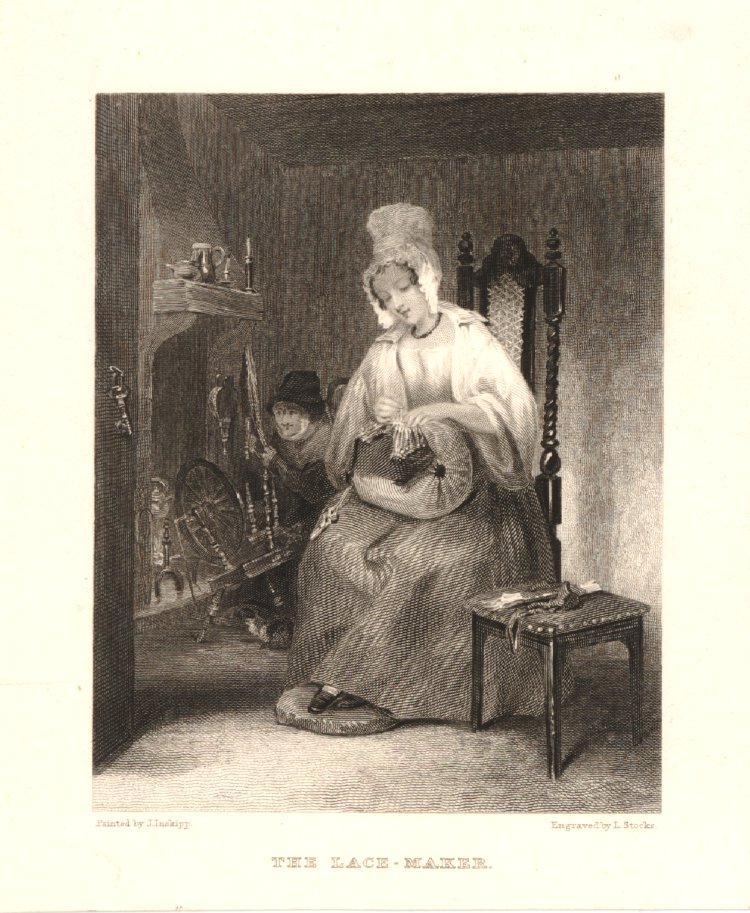

This is taken from this website.
This is comparing the lace maker, working at home, with the factory girl.
The Lace Maker by James Francis Hollings, The Amulet 10 (1835), pp. 141-4.
|
THERE was a time although departed long, It lives but on the page of ancient song When staid simplicity, and guileless mirth, Dwelt unmolested on our peaceful earth. As yet to life's more sheltered walks unknown, Ambition strove in distant courts alone; And feverish luxury held remote its state; And pomp to few unbarred its blazoned gate. In ancient halls, his fitting place of rest, Dwelt hoar Fidelity, an honoured guest; And gentle Courtesy, with winning power; And Humour, Proteus of the cheerful hour. No emulative pride, with vain display, Forestalled to-morrow's gifts to sate to-day; Yet rank to each a welcome could afford, And sweet contentment graced the liberal board. Then stood the mansion, as for centuries past, Its walls had felt the sunbeam and the blast, With circling groves, and lawn, for pleasaunce made, And shielded portal casting far its shade: Home of one race; nor destined to obey From year to year a new possessor's sway: Nor far remote, as scattered in repose, The modest hamlet's quiet roofs arose, Swart toil's abodes, and such as to invite Meek peace by day, and dreamless rest by night. How lightly then, while cares and wants were few, The hours of industry unheeded flew! When mists yet wreathed the path of morning grey, Abroad the sturdy peasant took his way; Yet left not, sheltered in his walls behind, The listless hand or uncontriving mind. Soon as the murmuring bee its toils begun, And dew-drops glistened in the mounting sun The wheels' low sound amidst the quiet shade Announced the matron at her busy trade; While, early trained to labour, at her side, Her graceful task the cottage maiden plied Well-skilled to weave, with studded pillow set, In meshes intricate, the snow-white net; And, o'er its verge, as if disporting, spread, To guide in varying forms, the filmy thread. Thus stole the day unweariedly along, From silence rescued by the voice of song, Or converse, staid and simple, as beseems The even tenour of the rustic's themes Tales of departed strife, or festal gay, The pomp of annual wake or bridal day, Of slighted presage, ominous and true, Or spectre, seen beside the churchyard yew; How in past times of dark distrust and fear, Tempests and clouds had marred the smiling year, And mildew seared the crops with midnight stroke, Or fiery levin cleft the forest oak; Whose wheat looked fairest from the upland glade; Who ruled in vestries; who the market swayed; And whose the voice which, on the day of rest, The choir in anthems old acknowledged best. Few are those scenes of cheerful labour now. With downcast look and melancholy brow, In factories pent, where dim the sunlight steals O'er shifting frames, and strife of maddened wheels; From morn's pale glance till glimmering day declines, The graceful form of childhood droops and pines, Toil's sickly thrall! and, from its hapless birth, Barred from that wealth ordained for all on earth. Unfelt the breathings of the wind which brings Joy in its voice and freshness on its wings; Unseen those hues of splendour which adorn The glowing eve, or pageantry of morn; Unmarked each rolling season's course, or known By different grades of bitterness alone; But known too well the taint, which inly spread, Pollutes life's waters at their fountain-head; Temptation's wiles, and crime's soon-quickened seed, In whispered counsel, or in witnessed deed; Affection's blight; blind error's stubborn will; Want, first, nor least, prolific source of ill; And, last, that wan disease, which day by day Distorts and wastes, but far too stern to slay; Despair's vain wish of quick release denies, And links with pain each moment as it flies. Oh, ye! who, nursed in golden hours, possess The power, but bounded by the will, to bless; Who know, by consciousness long felt, how dear The voice of childhood to a parent's ear; Say, in a land unknown to slavery's tread, Why weeps the infant at a fate more dread? Why, while on shores remote deliverance stands, And the riven fetter falls from Afric's hands, Domestic bondage? and, than bondage worse, Life's dawn exposed to sin's contagious curse? Why, in that atmosphere of guilt and shame, Does virgin innocence forget its name? Why, from the sense of harsh oppression wrung, Dwells execration on the lisping tongue? And why, where busy commerce holds her reign, Does fancy view a Syrian Moloch's fane? Reply; and, when to truth's keen quest denied, Such evil lurks no more our hearths beside, Then shall the care whose exercise secures Another's seed, a blessing bring on yours; Then may our prayers, indeed, at Mercy's throne, For helpless orphancy and youth made known Each peaceful Sabbath to the approving skies, Mixed with no guilt of mockery arise; And foreign calumny confuted flee; And Britain vaunt, in truth, her name THE FREE! |
This poem was illustrated with the following engraving, by Lumb Stocks, of James Inskipp's painting "A Girlk Making Lace".

© Jo Edkins 2023 - return to lace index